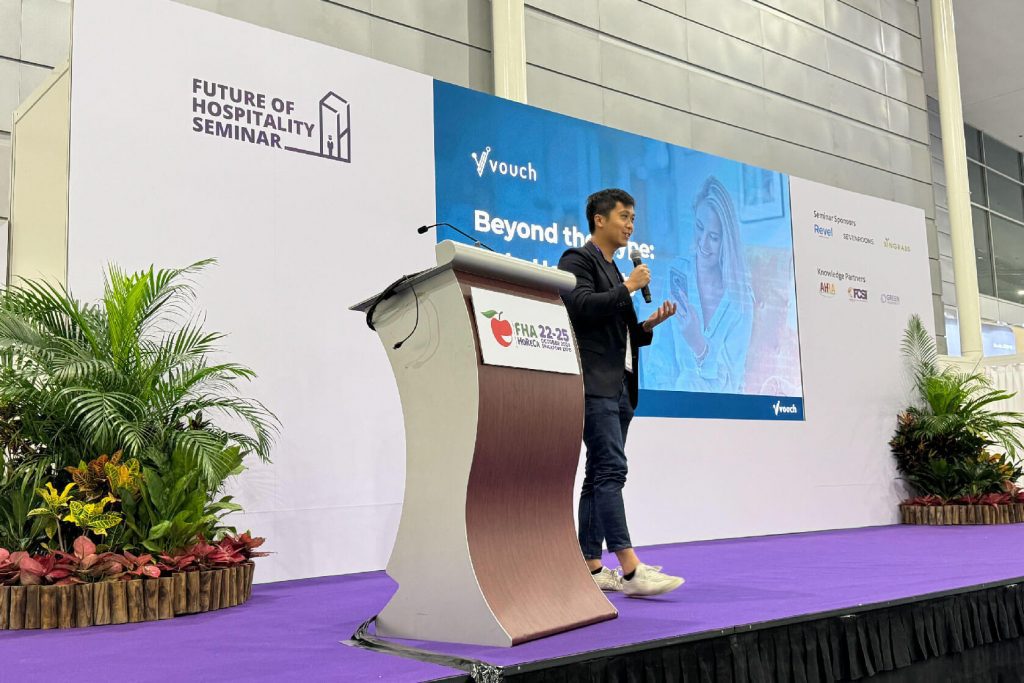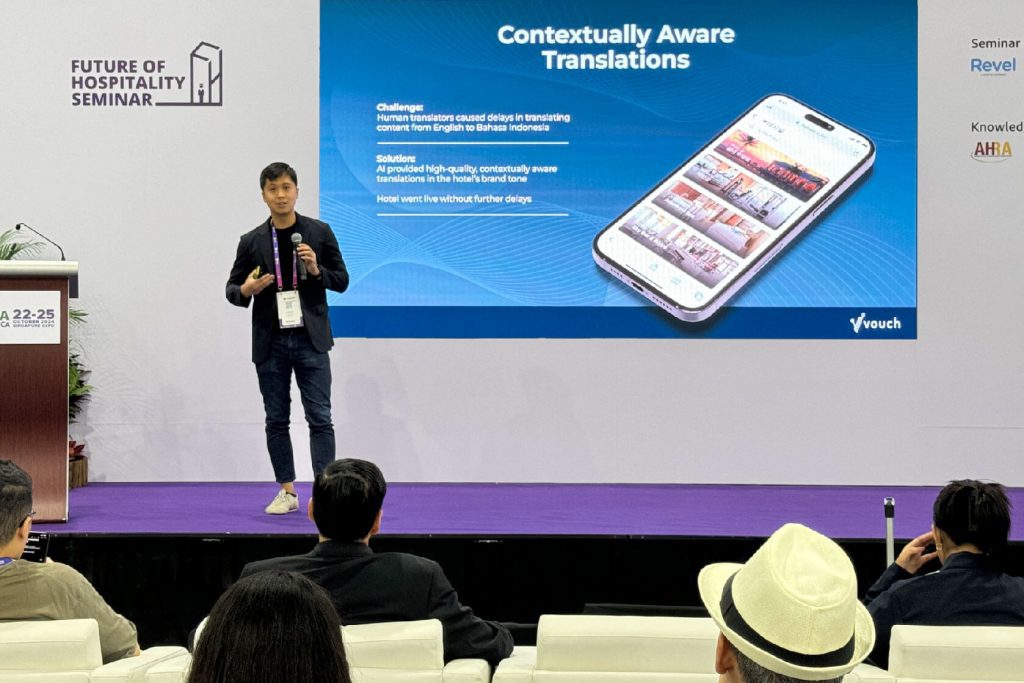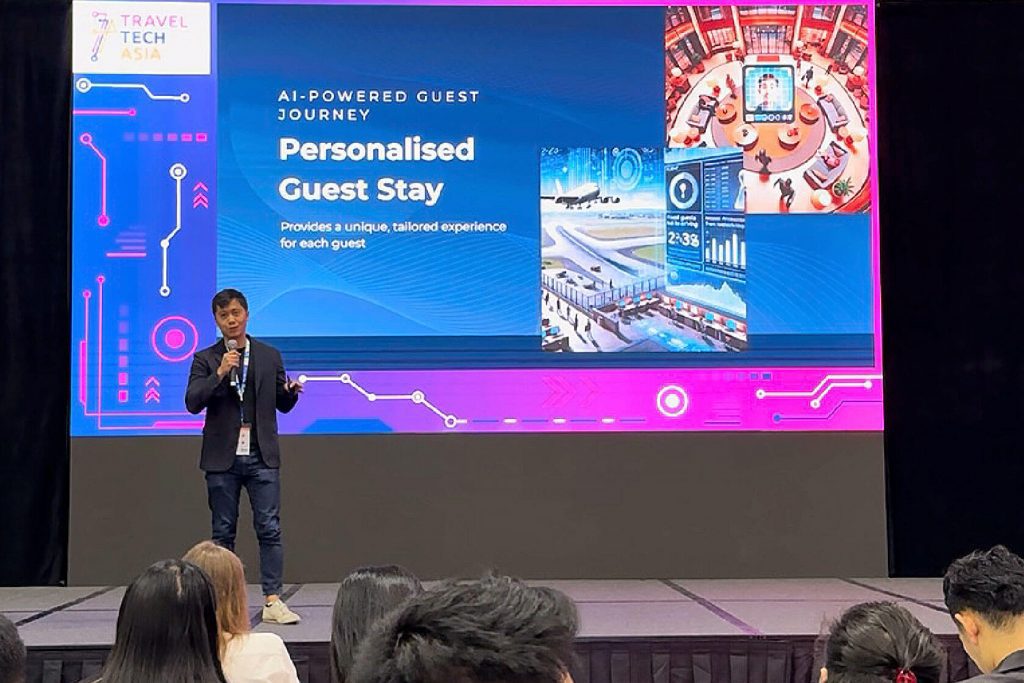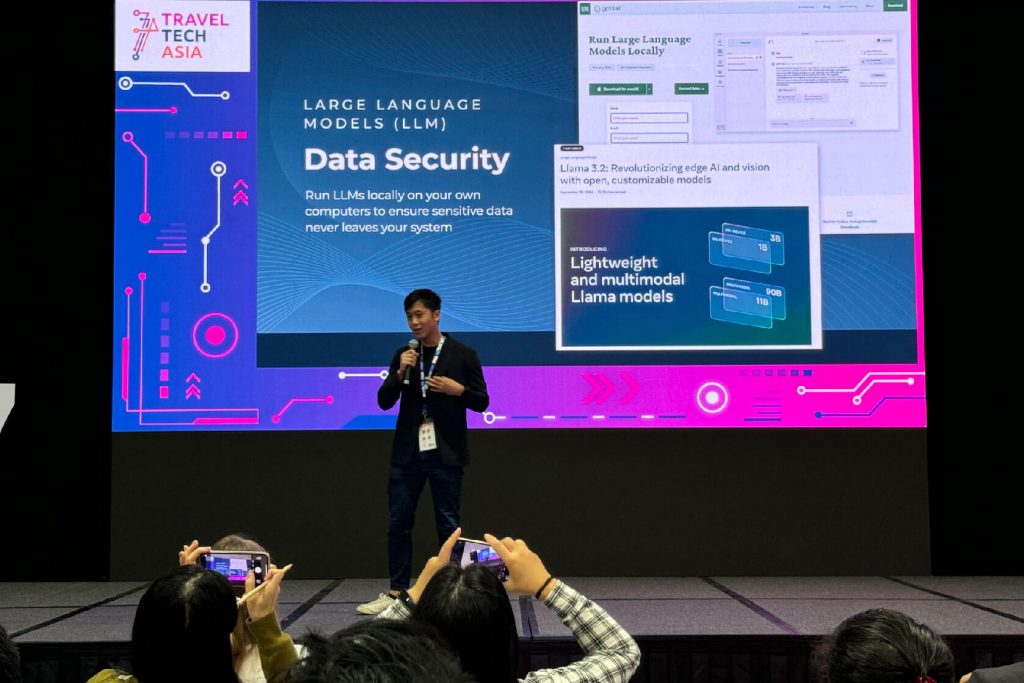
FHA-HoReCa and Travel Tech Asia 2024 – Beyond the Hype: AI in Hospitality
At FHA-HoReCa and Travel Tech Asia 2024, two of Asia’s most important hospitality and travel tech events, Vouch’s Founder & CEO, Joseph Ling, took the stage and shared his insights on AI’s transformative potential for the industry.
Joseph founded Vouch in 2016 and the company has since grown to become an international chain approved (Accor, Hyatt, IHG) travel-tech company that provides innovative technology to the hospitality segment to enhance productivity, boost revenue and elevate the overall guest experience. Today, Vouch’s solutions are present in more than 35,000 rooms across APAC.
As one of the first Asian companies to implement AI in the travel tech space, Vouch has unique insights into how technology can bridge the gap between operational efficiency and exceptional guest experiences. Through Joseph’s vision, Vouch has become synonymous with innovative AI applications that empower hotels to elevate guest experiences, streamline operations, and drive revenue growth.
Joseph’s talk, Beyond the Hype: AI in Hospitality, hit on a critical insight: AI can indeed transform hotel operations, but only for those who understand how to use it effectively.
“AI doesn’t work miracles for everyone,” Joseph emphasized. “For those who know how to implement it purposefully, it delivers real, measurable results. But for those who don’t understand it, AI can quickly become disappointing or, worse, ineffective.”
This balanced approach is central to Vouch’s philosophy of making AI accessible and practical. In an industry where AI is often seen as an easy solution for everything, Joseph clarified that its power lies in strategic application and a clear understanding of its strengths and limitations.
Cutting Through the AI Hype
“AI has to do more than make grand promises. We’re seeing how, when used properly, it can bring real, measurable results. For example, one of our client hotels saw a 20% uplift in F&B revenue just by using predictive and generative AI to customize menu offerings,” Joseph shared.
He broke down how predictive and generative AI play distinct yet complementary roles. Predictive AI, he explained, has been around to forecast guest demand and behaviors. But, “Generative AI changes the game,” he said. “It creates – from guest-specific content to personalized experiences – opening up a whole new era of what’s possible in hospitality.”
Practical Applications of AI in Hospitality
1. Streamlined Onboarding with AI
Giving an account of a typical onboarding process with hotels, he said: “Onboarding used to be a time-consuming process whereby significant amounts of data have to be collated to populate the platform with information and content. Hotel marketing teams would have to manually gather details like room descriptions and amenities and feed it into the system.”
“This is where one of the key strengths of GenAI comes into play – the ability to mimic tone of voice. AI is able to automate much of this process by scraping through public data to auto-populate content and align it with the hotel’s brand tone and style.”
“With that, onboarding time was reduced from weeks to just hours. By using AI to gather data and shape content to a hotel’s unique brand tone, hotels are able to accelerate their go-to-market time while keeping to brand standards.”
2. Contextually Aware Translations
Joseph then proceeded to share the second advantage that GenAI has – the ability to understand context.
“AI-driven translations now go beyond literal word conversion to capture brand tone and context accurately. For example, translating ‘poolside snacks’ should be done in a way that conveys a relaxed vibe, rather than a sterile phrase, to entice guests and prevent potential misunderstandings.”
“We had this problem where one of the hotels that we work with wanted to translate our platform from English to Bahasa Indonesia. They engaged a human translator and it took them about a month to get back with the translations. The hotel felt like something was still not right and wanted to delay the go-live of our product.” He recounted.
He added: “I told my team, ‘why don’t we use GenAI to do the translations for them?’ and we happen to have just built a feature to do that. We then told them that we will provide them with the Bahasa Indonesia translations and it turns out, they were happy with the translations! We ended up going live with the GenAI translations because the hotel was so satisfied with it.”
3. Boosting F&B Revenue with Predictive and Generative AI
Joseph also highlighted how Vouch’s solutions can drive up ancillary revenue by tailoring F&B offerings to guest preferences.
“When a guest orders in-room dining, our solution collects and reveals insights on guest ordering behaviour. Predictive AI uses this data to make smart suggestions on which menu items are likely to pair and perform well, allowing hotels to tailor their food and beverage offerings to boost ancillary revenue. Generative AI then crafts engaging, brand-consistent descriptions that encourage guests to try these dishes.”
“And for that, we were able to achieve a 20% uplift in F&B revenue for one of our clients.” he explained.
The Future of AI: A Personalized Guest Journey
Joseph then invited attendees to imagine what a fully AI-driven guest experience could mean: “In your hotel’s PMS, you would already have plenty of information about a repeat guest in the PMS notes even before their arrival. Why not start using AI to summarise those notes?”
He illustrated this with a vivid example: “Imagine this – a guest named John stays regularly at your hotel, and each time, he requests an exercise bike and workout clothes in his room. AI picks up on this behavioural trend through the PMS notes and generates a task for the housekeeping staff to place an exercise bike and some workout clothes in his room even before he arrives.”
“Staff only need to approve the task, not create it. That’s real efficiency.”
Joseph also shared the idea of personalized communication through generative AI. “Imagine each guest receiving a newsletter that highlights amenities, services, or experiences they’re likely to enjoy based on their preferences in the PMS/CRM. No more generic messages – instead, they get curated information that feels relevant and personalized.”
Expanding on the idea of an AI-powered guest journey, he added: “You can even integrate your PMS with the airport’s APIs to know when your guests have arrived. That way, when a flight lands, a pop-up appears informing your staff that ‘Flight XYZ has landed and these are the guests that will be arriving at your hotel in the next two hours’ so your staff can make the necessary preparations.”
“Imagine when John walks into your lobby – a camera recognizes him, and a notification appears for the front desk: ‘John has arrived. Here’s what you need to know.’ Your staff are informed, prepared, and able to provide that extra level of welcome that goes beyond a simple check-in,” he elaborated.
He also explained how AI can elevate even the smallest details into powerful touchpoints: “If John often asks the hotel to make reservations at his favourite restaurant, the PMS can prompt your team to check if he’d like them to make a booking there for him again. This small gesture shows attentiveness, making John feel valued.”
AI also opens doors to more personalized upselling and service recovery. “Suppose the PMS reveals that John usually purchases a club lounge access, but hasn’t done so this stay, AI can flag this so your staff can check with the guest if they would like to purchase the club lounge access or even offer it at a discount for service recovery.”
He then highlighted that this is how hotels can show guests that they notice and care for them. “It’s a VIP touch for all guests, not just VIPs.”
How Hotels Can Get Started with AI
As hotels handle sensitive information pertaining to their guests, keeping that data secure is a top priority.
“One solution is running large language models (LLMs) locally on your own computers instead of relying on cloud-based services to ensure that sensitive guest data never leaves your systems.” Joseph said.
A practical example shared during the talk covered how local AI models can be used to draft personalised welcome emails for guests.
“By running an LLM locally, tailored emails that align with each guest’s preferences can be generated – all without sending their sensitive data to an external server. This allows the hotel to maintain personalisation while keeping data secure and compliant with privacy regulations.”
Another tip shared was the advantages of using off-the-shelf AI models. These models remain cost-effective, adaptable, and are continuously updated, allowing hotels to benefit from the latest advancements.
The Future is Here – AI in Hospitality Today and Tomorrow
Wrapping up, Joseph left attendees with a clear message: “AI is here now and solving real problems in hospitality. It will continue to shape how we engage with guests and run our operations, so take that first step and see how AI can transform guest engagement and operations – because AI isn’t just hype; it’s the future of hospitality.”

FHA-HoReCa and Travel Tech Asia 2024 – Beyond the Hype: AI in Hospitality
At FHA-HoReCa and Travel Tech Asia 2024, two of Asia’s most important hospitality and travel tech events, Vouch’s Founder & CEO, Joseph Ling, took the stage and shared his insights on AI’s transformative potential for the industry.
Joseph founded Vouch in 2016 and the company has since grown to become an international chain approved (Accor, Hyatt, IHG) travel-tech company that provides innovative technology to the hospitality segment to enhance productivity, boost revenue and elevate the overall guest experience. Today, Vouch’s solutions are present in more than 35,000 rooms across APAC.
As one of the first Asian companies to implement AI in the travel tech space, Vouch has unique insights into how technology can bridge the gap between operational efficiency and exceptional guest experiences. Through Joseph’s vision, Vouch has become synonymous with innovative AI applications that empower hotels to elevate guest experiences, streamline operations, and drive revenue growth.
Joseph’s talk, Beyond the Hype: AI in Hospitality, hit on a critical insight: AI can indeed transform hotel operations, but only for those who understand how to use it effectively.
“AI doesn’t work miracles for everyone,” Joseph emphasized. “For those who know how to implement it purposefully, it delivers real, measurable results. But for those who don’t understand it, AI can quickly become disappointing or, worse, ineffective.”
This balanced approach is central to Vouch’s philosophy of making AI accessible and practical. In an industry where AI is often seen as an easy solution for everything, Joseph clarified that its power lies in strategic application and a clear understanding of its strengths and limitations.
Cutting Through the AI Hype
“AI has to do more than make grand promises. We’re seeing how, when used properly, it can bring real, measurable results. For example, one of our client hotels saw a 20% uplift in F&B revenue just by using predictive and generative AI to customize menu offerings,” Joseph shared.
He broke down how predictive and generative AI play distinct yet complementary roles. Predictive AI, he explained, has been around to forecast guest demand and behaviors. But, “Generative AI changes the game,” he said. “It creates – from guest-specific content to personalized experiences – opening up a whole new era of what’s possible in hospitality.”
Practical Applications of AI in Hospitality
1. Streamlined Onboarding with AI
Giving an account of a typical onboarding process with hotels, he said: “Onboarding used to be a time-consuming process whereby significant amounts of data have to be collated to populate the platform with information and content. Hotel marketing teams would have to manually gather details like room descriptions and amenities and feed it into the system.”
“This is where one of the key strengths of GenAI comes into play – the ability to mimic tone of voice. AI is able to automate much of this process by scraping through public data to auto-populate content and align it with the hotel’s brand tone and style.”
“With that, onboarding time was reduced from weeks to just hours. By using AI to gather data and shape content to a hotel’s unique brand tone, hotels are able to accelerate their go-to-market time while keeping to brand standards.”
2. Contextually Aware Translations
Joseph then proceeded to share the second advantage that GenAI has – the ability to understand context.
“AI-driven translations now go beyond literal word conversion to capture brand tone and context accurately. For example, translating ‘poolside snacks’ should be done in a way that conveys a relaxed vibe, rather than a sterile phrase, to entice guests and prevent potential misunderstandings.”
“We had this problem where one of the hotels that we work with wanted to translate our platform from English to Bahasa Indonesia. They engaged a human translator and it took them about a month to get back with the translations. The hotel felt like something was still not right and wanted to delay the go-live of our product.” He recounted.
He added: “I told my team, ‘why don’t we use GenAI to do the translations for them?’ and we happen to have just built a feature to do that. We then told them that we will provide them with the Bahasa Indonesia translations and it turns out, they were happy with the translations! We ended up going live with the GenAI translations because the hotel was so satisfied with it.”
3. Boosting F&B Revenue with Predictive and Generative AI
Joseph also highlighted how Vouch’s solutions can drive up ancillary revenue by tailoring F&B offerings to guest preferences.
“When a guest orders in-room dining, our solution collects and reveals insights on guest ordering behaviour. Predictive AI uses this data to make smart suggestions on which menu items are likely to pair and perform well, allowing hotels to tailor their food and beverage offerings to boost ancillary revenue. Generative AI then crafts engaging, brand-consistent descriptions that encourage guests to try these dishes.”
“And for that, we were able to achieve a 20% uplift in F&B revenue for one of our clients.” he explained.
The Future of AI: A Personalized Guest Journey
Joseph then invited attendees to imagine what a fully AI-driven guest experience could mean: “In your hotel’s PMS, you would already have plenty of information about a repeat guest in the PMS notes even before their arrival. Why not start using AI to summarise those notes?”
He illustrated this with a vivid example: “Imagine this – a guest named John stays regularly at your hotel, and each time, he requests an exercise bike and workout clothes in his room. AI picks up on this behavioural trend through the PMS notes and generates a task for the housekeeping staff to place an exercise bike and some workout clothes in his room even before he arrives.”
“Staff only need to approve the task, not create it. That’s real efficiency.”
Joseph also shared the idea of personalized communication through generative AI. “Imagine each guest receiving a newsletter that highlights amenities, services, or experiences they’re likely to enjoy based on their preferences in the PMS/CRM. No more generic messages – instead, they get curated information that feels relevant and personalized.”
Expanding on the idea of an AI-powered guest journey, he added: “You can even integrate your PMS with the airport’s APIs to know when your guests have arrived. That way, when a flight lands, a pop-up appears informing your staff that ‘Flight XYZ has landed and these are the guests that will be arriving at your hotel in the next two hours’ so your staff can make the necessary preparations.”
“Imagine when John walks into your lobby – a camera recognizes him, and a notification appears for the front desk: ‘John has arrived. Here’s what you need to know.’ Your staff are informed, prepared, and able to provide that extra level of welcome that goes beyond a simple check-in,” he elaborated.
He also explained how AI can elevate even the smallest details into powerful touchpoints: “If John often asks the hotel to make reservations at his favourite restaurant, the PMS can prompt your team to check if he’d like them to make a booking there for him again. This small gesture shows attentiveness, making John feel valued.”
AI also opens doors to more personalized upselling and service recovery. “Suppose the PMS reveals that John usually purchases a club lounge access, but hasn’t done so this stay, AI can flag this so your staff can check with the guest if they would like to purchase the club lounge access or even offer it at a discount for service recovery.”
He then highlighted that this is how hotels can show guests that they notice and care for them. “It’s a VIP touch for all guests, not just VIPs.”
How Hotels Can Get Started with AI
As hotels handle sensitive information pertaining to their guests, keeping that data secure is a top priority.
“One solution is running large language models (LLMs) locally on your own computers instead of relying on cloud-based services to ensure that sensitive guest data never leaves your systems.” Joseph said.
A practical example shared during the talk covered how local AI models can be used to draft personalised welcome emails for guests.
“By running an LLM locally, tailored emails that align with each guest’s preferences can be generated – all without sending their sensitive data to an external server. This allows the hotel to maintain personalisation while keeping data secure and compliant with privacy regulations.”
Another tip shared was the advantages of using off-the-shelf AI models. These models remain cost-effective, adaptable, and are continuously updated, allowing hotels to benefit from the latest advancements.
The Future is Here – AI in Hospitality Today and Tomorrow
Wrapping up, Joseph left attendees with a clear message: “AI is here now and solving real problems in hospitality. It will continue to shape how we engage with guests and run our operations, so take that first step and see how AI can transform guest engagement and operations – because AI isn’t just hype; it’s the future of hospitality.”



